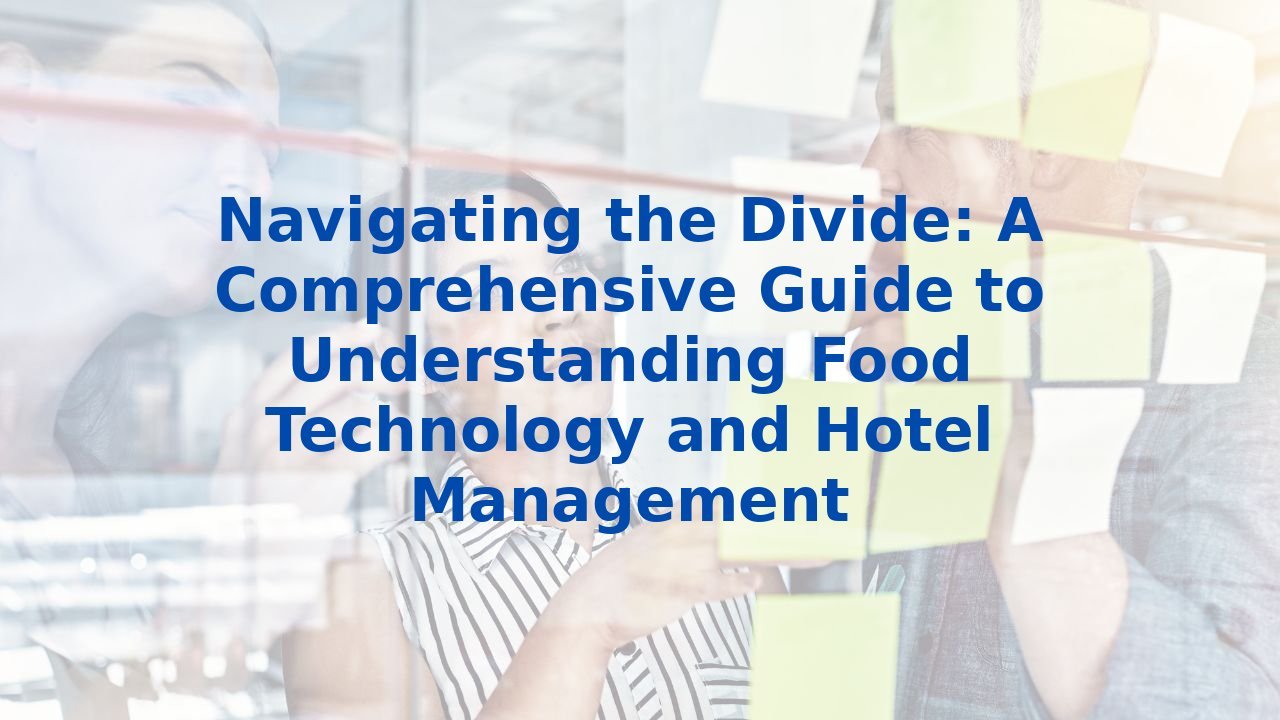Navigating the Divide: A Comprehensive Guide to Understanding Food Technology and Hotel Management
Navigating the Divide: A Comprehensive Guide to Understanding Food Technology and Hotel Management
Introduction
In the vibrant realm of hospitality, two pivotal domains often intertwine yet remain distinct: Food Technology and Hotel Management. Understanding the unique contributions of each field is essential to appreciating the breadth of the hospitality industry. This exploration dives into the core of these sectors while spotlighting how Artificial Intelligence (AI) can revolutionize their operations, streamlining processes, and enhancing effectiveness.
What is Food Technology?
Food Technology stands as a multidisciplinary field that propels the food industry into vibrant innovation, safety, and sustainability. It's not merely about food preparation; it’s about utilizing scientific and technological advances to create healthier, safer, and more sustainable food products. This sector plays a crucial role in tackling pressing global food security challenges, focusing on:
- Innovation: Crafting new food products and processes using advanced technologies such as nanotechnology, biotechnology, and genomics.
- Safety: Upholding rigorous testing protocols and stringent quality control measures to safeguard against contamination.
- Sustainability: Committing to eco-friendly practices that reduce the environmental footprint of food production, processing, and distribution.
What is Hotel Management?
In contrast, Hotel Management envelops the operational oversight of hotels, resorts, and various hospitality venues. It demands a kaleidoscope of skills across marketing, human resources, accounting, and operations management. Key responsibilities include:
- Guest Services: Elevating guest experiences through impeccable front office operations and housekeeping management.
- Marketing and Sales: Deploying effective promotional strategies and optimizing room bookings to maintain high occupancy rates.
- Human Resources: Engaging in the recruitment, training, and supervision of staff to ensure top-notch service delivery.
The Role of AI in Food Technology
AI stands as a transformative force in Food Technology, significantly enhancing workflow and operational models. Here’s how:
- Predictive Analytics: Utilizing AI to foresee food spoilage and contamination, ensuring that only the safest products reach consumers.
- Quality Control: Implementing AI-powered systems for real-time monitoring of food quality, which detects deviations and triggers necessary interventions promptly.
- Supply Chain Optimization: Leveraging AI to fine-tune supply chains by forecasting demand and managing inventory, dramatically reducing waste and boosting efficiency.
The Role of AI in Hotel Management
Similarly, AI revolutionizes hotel management, infusing operational efficiency and enhanced guest interactions. Consider the following:
- Customer Service Automation: AI-driven chatbots handle inquiries around the clock, freeing up staff to focus on in-person guest interactions.
- Operational Efficiency: Tasks like room assignments and maintenance scheduling are streamlined through AI, minimizing human error and reducing operational costs.
- Data Analysis: AI analyzes vast data troves concerning guest preferences and behavior, equipping hotel managers with insights to bolster service delivery and boost satisfaction levels.
Benefits of Training Employees for AI
While the integration of AI into operations offers profound benefits, equipping employees with the necessary skills to harness this technology is equally crucial. Here’s why investing in AI training pays dividends:
- Enhanced Skills: A workforce that understands AI can perform tasks with greater efficiency, inadvertently improving overall productivity.
- Adaptability: With a grasp of AI technologies, employees can seamlessly adapt to evolving operational methods, increasing their value to the organization.
- Innovation: Trained employees are positioned to propose AI-driven solutions, cultivating a culture of continuous innovation that solidifies competitive advantages.
Conclusion
In summary, both Food Technology and Hotel Management occupy distinguished spaces within the hospitality ecosystem. By harnessing the power of AI, organizations in these sectors can streamline their operations and elevate service quality, positioning themselves as frontrunners in a competitive marketplace. Importantly, prioritizing comprehensive training in AI for employees is fundamental to unlocking these benefits, fostering an adaptable and innovative culture prepared for the future.
“The real challenge is not about technology itself, but rather how we integrate it into our lives and businesses for transformative outcomes.”
To explore more about integrating AI into your operations and empowering your workforce, delve deeper into AI training opportunities available for organizations seeking to thrive in this tech-savvy era.



